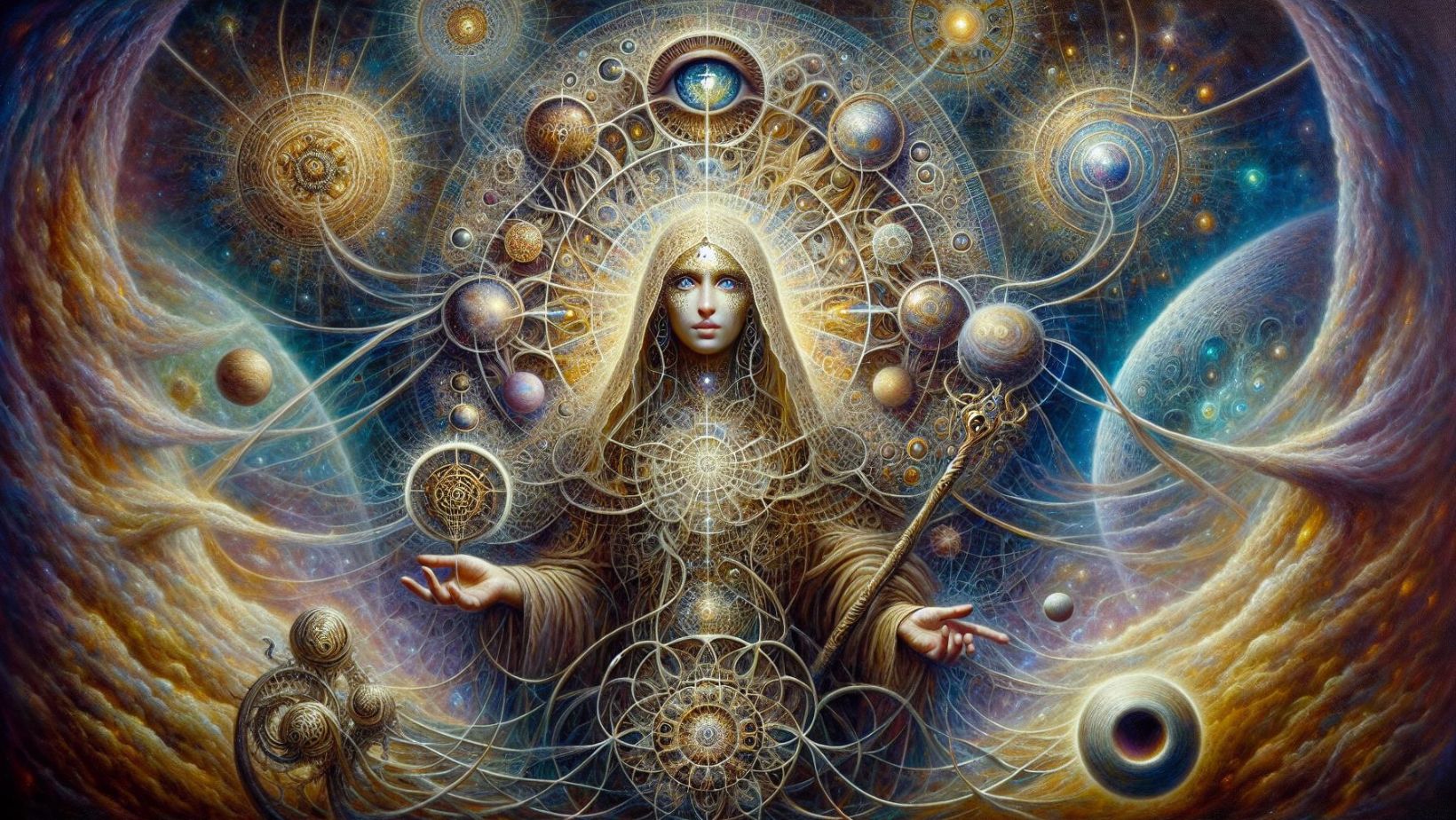Picture this: a powerful goddess who holds the threads of destiny in her hands, weaving the tapestry of fate for both mortals and gods alike. That’s Ananke Mythology, the Greek goddess of necessity, compulsion, and inevitability. She’s not exactly a household name like Zeus or Athena, but her role in Greek mythology is just as fascinating.
Table of Contents:
- The Role of Ananke in Greek Mythology
- Ananke’s Powers and Abilities
- Ananke in Ancient Greek Literature and Art
- The Significance of Ananke in Greek Thought
- Conclusion
The Role of Ananke in Greek Mythology: Ananke Mythology
In the vast tapestry of Greek mythology, few figures loom as large as Ananke. This primordial goddess embodied the very essence of necessity, inevitability, and fate itself.
To the ancient Greeks, Ananke was no mere deity – she was a force of nature, an inescapable reality that even the mighty Olympian gods had to bow before.
Ananke as a Primordial Goddess

In the Greek pantheon, Ananke held a unique position as one of the primordial deities. These were the first gods and goddesses, the ones who emerged at the dawn of creation itself.
Ananke was there from the very beginning, a powerful and ancient presence that predated even the Titans and Olympians. She was a fundamental part of the cosmic order, woven into the very fabric of the universe.
Ananke’s Influence on Fate and Destiny: Ananke Mythology
Perhaps Ananke’s most significant role in Greek mythology was her influence over fate and destiny.
And it was Ananke who held the threads of fate in her hands. She was the one who determined the course of mortal lives, the one who decided what trials and triumphs awaited each person.
Even the gods themselves were not immune to Ananke’s power.
Ananke’s Relationship with Other Greek Deities
While Ananke was a formidable presence in her own right, she was also closely connected to other deities in the Greek pantheon.
These three goddesses – Clotho, Lachesis, and Atropos – were responsible for spinning, measuring, and cutting the threads of mortal life.
Together, they formed a powerful triad, the ultimate arbiters of mortal existence.
Ananke’s Powers and Abilities: Ananke Mythology
As a primordial goddess, Ananke wielded immense power over the forces of necessity and inevitability. Her influence was felt in every corner of the cosmos, from the lives of mortal men to the machinations of the gods themselves.
Ananke’s Control Over Necessity and Inevitability
At her core, Ananke embodied the concept of necessity. She represented the immutable laws that governed the universe, the fundamental rules that could not be broken or bent.
In Greek thought, necessity was seen as an inescapable force, one that even the gods had to submit to. And Ananke was the personification of that force, the deity who ensured that the natural laws of the cosmos were always upheld.
This meant that Ananke’s power was absolute.
Ananke’s Symbolic Representation: Ananke Mythology
In ancient Greek art, Ananke was often depicted as a powerful, imposing figure. She was sometimes shown holding a spindle, a symbol of her role in weaving the threads of fate.
These artistic representations underscored Ananke’s status as a fundamental force of nature, a deity whose power was absolute and inescapable.
Ananke in Ancient Greek Literature and Art: Ananke Mythology
Ananke’s presence can be felt throughout ancient Greek literature and art. From the works of the great tragedians to the mysteries of Orphic religion, the goddess of necessity left an indelible mark on the cultural landscape of ancient Greece.
Ananke in Aeschylus’ Prometheus Bound
One of the most famous depictions of Ananke in ancient literature can be found in Aeschylus’ tragedy Prometheus Bound, which was first performed around 433 BC.
As he laments his fate, he invokes Ananke, acknowledging her power over even the immortal gods.
Ananke in Orphic Mysteries: Ananke Mythology
Ananke also played a significant role in the Orphic mystery cults of ancient Greece. These religious sects centered around the mythical figure of Orpheus and his journey into the underworld.
This symbolism underscored her role as a fundamental force of creation, a deity who set the wheels of existence in motion.
Artistic Depictions of Ananke
While literary references to Ananke abound, artistic depictions of the goddess are somewhat rarer. However, there are a few notable examples that have survived from ancient times.
Another famous representation of Ananke appears on the Hellenistic-era sculpture known as the Farnese Atlas.
The Significance of Ananke in Greek Thought:Ananke Mythology
Beyond her role in mythology and religion, Ananke also held a profound significance in ancient Greek philosophy and thought. Her influence can be seen in the works of some of the most renowned thinkers of the ancient world.
Ananke as a Representation of Cosmic Order

For many ancient Greek philosophers, Ananke represented the fundamental order of the universe.
This concept of cosmic necessity was central to Greek thought.
In this view, Ananke was not just a goddess, but a representation of the underlying structure of reality itself.
Ananke’s Influence on Greek Philosophy
The idea of Ananke as a cosmic necessity had a profound impact on Greek philosophy, particularly in the works of thinkers like Plato and Aristotle.
For these thinkers and many others, Ananke represented a key principle of the universe, a force that shaped the very nature of reality itself. She may have been a goddess in myth and legend, but in the realm of philosophy, she was something even more profound – a representation of the deep structure of the cosmos.
Key Takeaway: Ananke Mythology
Ananke, a primordial Greek goddess, embodies necessity and fate. Her power influences both mortal lives and gods’ destinies.
Conclusion: Ananke Mythology
Ananke mythology teaches us that even the gods are subject to the inescapable forces of necessity and fate. Her story reminds us that sometimes, we must accept what we cannot change and find the strength to navigate the path laid out before us.
So the next time you feel like you’re at the mercy of circumstances beyond your control, remember Ananke. Embrace the twists and turns of fate, and trust that everything happens for a reason. Who knows? You might just find a little bit of Ananke’s wisdom guiding you along the way.

